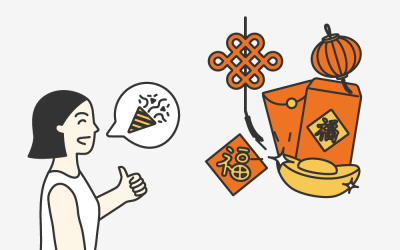As a Chinese beginner, at some point you might reach a plateau in your learning. Don’t worry, every Chinese learner has experienced that. Knowing some basic Chinese correlatives – “because”, if”, “while”, “even though” – will take your Chinese to a new level. Let’s explore the 5 most common Mandarin Chinese correlatives today!

1. 因为 (yīnwèi), 所以 (suǒyǐ)
因为 (yīnwèi) means “because”, and 所以 (suǒyǐ) means “therefore”. When “因为 (yīnwèi)…….所以 (suǒyǐ)……” is often used to indicate causality. When it comes to the use of this structure, the first part stands for the Reason, whereas the second part indicates the Result.
Example
因为我喜欢中国,所以我学中文。
(Yīnwèi wǒ xǐhuan Zhōngguó, suǒyǐ wǒ xué Zhōngwén.)
Since I like China, therefore I’m studying Chinese.
However, both 因为 (yīnwèi) and 所以(suǒyǐ) can be used on their own in a sentence, and here are some examples to help you better understand them:
我想去餐厅,因为我饿了。
(Wǒ xiǎng qù cāntīng, yīnwèi wǒ è le.)
I want to go to the restaurant because I’m hungry.
今天很热,所以我去游泳。
(Jīntiān hěn rè, suǒyǐ wǒ qù yóuyǒng.)
It’s very hot today, and therefore I’ll go swimming.
Vocabulary:
热 (rè) • hot
游泳 (yóuyǒng) • to swim

2. 虽然 (suīrán), 但是 (dànshì)
虽然 (suīrán) means “although”, 但是 (dànshì) means “but”. when put together, “虽然 (suīrán), 但是 (dànshì) “ translates as “even though….” and indicates concession. What you need to pay attention to is that if an English sentence starts with the word “although”, there is no need to add “but” to the beginning of the second part of the sentence. However, in Mandarin Chinese, these two words often appear in the same sentence as a structure.
Example
虽然中文很难,但是很有意思。
Suīrán Zhōngwén hěn nán, dànshì hěn yǒuyìsi.
Although Chinese is very hard, however, it’s very interesting.
Vocabulary
难 (nán) • difficult
有意思 (yǒu yìsi) • interesting

3. 不但 (bùdàn), 而且 (érqiě)
不但 (bùdàn) means “not only”, 而且 (érqiě) means “furthermore”. When put together, “不但 (bùdàn)……而且 (érqiě)……” means “not only…..but also…..”. As the word 而且 (érqiě) means “moreover”, therefore, the structure is usually used when you would like to add some additional information about something or someone. Besides, “而且(érqiě)” can sometimes be followed by 还 (hái) (meaning also/still) in order to put an emphasis on the second part.
Example
Emily 不但漂亮,而且(还)很聪明。
Emily bùdàn piàoliang, érqiě (hái) hěn cōngmíng.
Emily is not only beautiful but also very smart.
Vocabulary
漂亮 (piàoliang) • beautiful
聪明 (cōngmíng) • smart, clever

4. 一边 (yībiān), 一边 (yībiān)
The literal meaning of 一边(yī biān) is “one side”, and the structure can be used to describe a person who is doing two things at the same time, which is very close to the literal translation of the structure (doing things on two sides).
Example
我一边喝咖啡一边听音乐。
(Wǒ yībiān hē kāfēi yībiān tīng yīnyuè.)
I drink coffee while listening to music.
Vocabulary
音乐 (yīnyuè) • music

5. 如果 (rúguǒ), 就 (jiù)
如果 (rúguǒ) means “if”, 就 (jiù) means “as soon as”, and when put together, the structure translates as “if…”. It is often used to express the idea that something can only be done under a certain condition. In this structure, 如果 (rúguǒ) is followed by the condition, and the outcome goes after the word 就 (jiù).
Example
如果明天不下雨,我们就去公园.
(Rúguǒ míngtiān bù xià yǔ, wǒmen jiù qù gōngyuán.)
We’ll go to the park if it doesn’t rain tomorrow.
Vocabulary
下雨 (xià yǔ) • to rain
公园 (gōngyuán) • park
We hope you had fun trying to learn Mandarin Chinese Correlatives!
If you’re interested in learning about Chinese grammar, read this article on Loan Words in Mandarin Chinese.








0 Comments